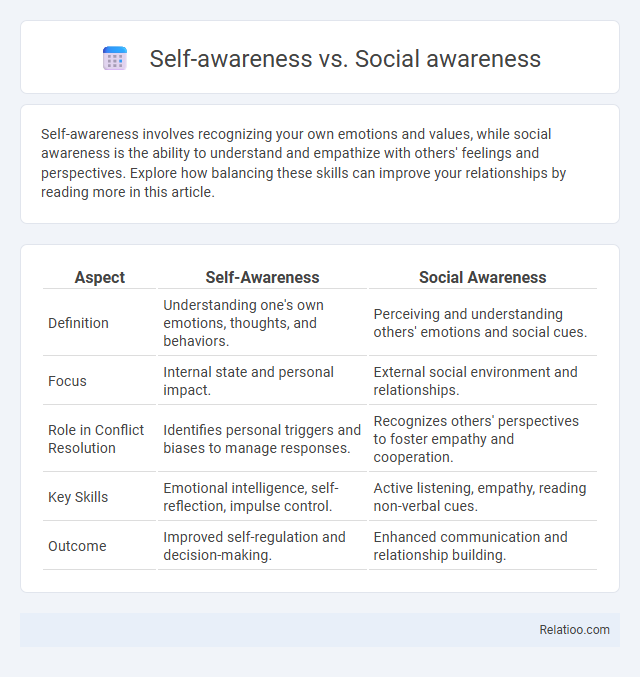Self-awareness involves recognizing your own emotions and values, while social awareness is the ability to understand and empathize with others' feelings and perspectives. Explore how balancing these skills can improve your relationships by reading more in this article.
Table of Comparison
| Aspect | Self-Awareness | Social Awareness |
|---|---|---|
| Definition | Understanding one's own emotions, thoughts, and behaviors. | Perceiving and understanding others' emotions and social cues. |
| Focus | Internal state and personal impact. | External social environment and relationships. |
| Role in Conflict Resolution | Identifies personal triggers and biases to manage responses. | Recognizes others' perspectives to foster empathy and cooperation. |
| Key Skills | Emotional intelligence, self-reflection, impulse control. | Active listening, empathy, reading non-verbal cues. |
| Outcome | Improved self-regulation and decision-making. | Enhanced communication and relationship building. |
Understanding Self-Awareness: Definition and Importance
Self-awareness is the conscious knowledge of your own character, feelings, motives, and desires, playing a critical role in personal growth and emotional intelligence. Social awareness involves recognizing and understanding the emotions, needs, and concerns of others, facilitating effective communication and empathy. Understanding self-awareness enables you to manage your behaviors and responses better, leading to improved relationships and decision-making skills.
The Core Elements of Social Awareness
Social awareness centers on the core elements of empathy, perspective-taking, and understanding social cues to effectively navigate interpersonal relationships. It involves recognizing others' emotions, interpreting body language, and responding appropriately to social dynamics. Unlike self-awareness, which focuses on internal thoughts and feelings, social awareness requires attunement to external social environments and contextual behaviors.
Key Differences Between Self-Awareness and Social Awareness
Self-awareness involves understanding your own emotions, thoughts, and values, while social awareness focuses on recognizing and empathizing with the emotions and needs of others. The key difference lies in the internal versus external focus: self-awareness centers on your personal experiences and self-regulation, whereas social awareness enhances your ability to navigate social contexts and build relationships. Developing your self-awareness improves emotional intelligence, but combining it with social awareness fosters better communication and collaboration in social or professional settings.
How Self-Awareness Influences Personal Growth
Self-awareness involves recognizing Your own emotions, thoughts, and behaviors, which directly impacts personal growth by enabling intentional change and healthier decision-making. In contrast, social awareness focuses on understanding others' feelings and social cues, enhancing interpersonal relationships but supporting growth indirectly. Developing self-awareness sharpens emotional intelligence and fosters resilience, making it a critical driver of continuous self-improvement and fulfillment.
The Role of Social Awareness in Building Relationships
Social awareness enhances your ability to understand others' emotions, perspectives, and social cues, which is crucial for building strong, empathetic relationships. Unlike self-awareness, which focuses on recognizing your own emotions and behaviors, social awareness expands your emotional intelligence by fostering compassion and effective communication. Developing social awareness leads to deeper connections and improved collaboration in both personal and professional settings.
Developing Self-Awareness: Effective Strategies
Developing self-awareness involves recognizing your emotions, thoughts, and behaviors to understand how they influence your actions and relationships. Effective strategies include reflective journaling, mindfulness practices, and seeking feedback from others to gain deeper insights into your inner experiences. Enhancing your self-awareness improves emotional intelligence and interpersonal skills, helping you navigate social interactions with greater empathy and clarity.
Enhancing Social Awareness Skills in Daily Life
Enhancing social awareness skills in daily life involves recognizing and understanding the emotions, needs, and perspectives of those around you, which complements your self-awareness by creating stronger interpersonal connections. By actively observing social cues, practicing empathetic listening, and reflecting on group dynamics, you can improve your ability to respond thoughtfully and build meaningful relationships. Developing these skills fosters greater emotional intelligence, empowering you to navigate social situations with confidence and sensitivity.
The Interplay Between Self-Awareness and Social Awareness
The interplay between self-awareness and social awareness shapes your ability to navigate complex social environments by balancing internal understanding with external perception. Self-awareness involves recognizing your own emotions, thoughts, and behaviors, while social awareness requires accurately interpreting others' emotions and social cues. Developing both enhances emotional intelligence, leading to improved communication, empathy, and interpersonal relationships.
Overcoming Barriers to Self and Social Awareness
Overcoming barriers to self-awareness requires identifying personal blind spots and embracing honest self-reflection, which empowers your growth and emotional regulation. Social awareness improves by actively listening to others' perspectives and recognizing social cues, fostering empathy and stronger interpersonal connections. Developing both self-awareness and social awareness cultivates emotional intelligence essential for effective communication and relationship-building.
Self-Awareness and Social Awareness in Professional Success
Self-awareness involves understanding one's emotions, strengths, and weaknesses, which enhances decision-making and personal growth in the workplace. Social awareness, the ability to perceive and empathize with others' emotions and social dynamics, improves communication and teamwork. Together, these skills foster leadership effectiveness and contribute significantly to professional success by promoting adaptability and collaboration.

Infographic: Self-awareness vs Social awareness
 relatioo.com
relatioo.com